- Home
- Janet Evanovich
The Job Page 3
The Job Read online
Page 3
“Whoever is doing this got close enough to you at some point to get your fingerprints from you or from something you touched,” Kate said.
Nick flopped back onto the bed. “That narrows it down to every bartender, waitress, and hotel housekeeper I’ve ever encountered.”
“Why the goblet?” Kate asked. “What does the goblet have in common with the Gleaberg painting?”
“Nothing, other than me.”
“Do not leave the United States until this is over,” Kate told him. “Go into hiding. Act as if you’re a fugitive on the FBI’s Ten Most Wanted list. That shouldn’t be too hard for you … since you are number seven.”
Kate awoke just as the Turkish Airlines plane began its early morning descent to Atatürk Airport. Far below her the Bosphorus Strait divided the historic city of Istanbul. Europe was to the west and Asia to the east.
She was traveling light with just her duffel bag, so she deplaned and went straight to Customs. She showed the officer her brown FBI passport, which notified authorities that she was on official business. The agent eyed her suspiciously for a few long seconds, stamped her documents, and motioned her through.
Kate had been told that someone would meet her just past Customs. She expected it would be a driver from the Turkish police or the U.S. Consulate. The man holding the iPad with her name on it was neither of those. He wore a black fez, dark sunglasses, a white turtleneck shirt, and a black Nehru jacket with a flowered emblem on the breast pocket. The emblem was a tulip with a curved dagger for a stem.
With the exception of the iPad, Kate thought he could have passed for a Turkish assassin in a cheesy 1960s spy movie. In which case there would be another assassin in a fez hiding behind a pillar, waiting to kill her with a blow dart if the turtleneck killer failed. And then a handsome man would pop up to save her. Indiana Jones.
The turtleneck killer approached her. “Welcome to Istanbul, Bayan O’Hare.” He tucked the iPad under one arm and reached for her duffel bag with the other. “I am Erdin. I will take you to the Aykut Demirkan Museum.”
“I was expecting someone from the Turkish police or the U.S. Consulate to meet me.”
“I work for the Demirkan Foundation. Chief Investigator Semir Atalay of the Emniyet Genel Müdürlügü, our police department, and Bayan Ceren Demirkan, the director of the Foundation, are awaiting you at the museum. They are most eager to see you. Please come along.”
Kate followed him out of the building and onto the tarmac, where a black helicopter was waiting. The tulip and dagger emblem was splashed across its side, and a red carpet led to the steps. They boarded without ceremony, and the helicopter lifted up and headed out over the Bosphorus.
Erdin pointed out the Blue Mosque, the Hagia Sophia, and Topkapi Palace. “These are our national treasures,” he said, his voice coming through Kate’s headset. “They were long ago constructed as symbols of faith, wealth, and power. They are now open to the public.”
“I know all about them,” Kate said. “I saw a special on the Travel Channel, but they’re even more amazing in person, with the morning sun shining on them.”
The chopper followed the Bosphorus Strait toward a huge suspension bridge. Just before they reached the bridge, the helicopter veered sharply to the west, and flew over a large waterfront villa.
“This is the Aykut Demirkan Museum,” Erdin told Kate. “It’s in a yali, a summer house that has belonged to the Demirkans for many generations.”
Kate had grown up on a bunch of army bases, and her summer house experience was a tent in the woods. The Demirkan summer house was huge. Four stories, with ornate marble and gold trimmings.
The helicopter fluttered down onto the lawn, not far from a tall woman wearing a white dress and a short man in an ill-fitting gray suit. The welcoming committee, Kate thought, waiting for the helicopter to wind down before she disembarked and walked to the man and woman.
“I’m Special Agent Kate O’Hare,” she said, offering her hand to the man, who had a high, shiny brow and a wispy gray-flecked goatee.
“Chief Inspector Atalay,” he said. “I look forward to working with you.” He turned toward the woman beside him. “This is Ceren Demirkan. She runs her family’s foundation, which owns this museum and the collection it contains.”
Ceren offered her hand. She had long, delicate fingers, and pale, glowing skin that gave the middle-aged woman an almost ethereal quality.
“I’m so glad you’re here,” Ceren said. “I understand you’re the expert on Nicolas Fox.”
“I’ve spent a lot of years chasing him,” Kate said.
“You are also the only one who has ever captured him. And if you did it once, you can do it again.”
Kate was beginning to see the dynamic at work here, and why the Bureau’s legal attaché had been able to clear her travel so quickly. Ceren thought Kate was the one and only magician who could snag Fox and reclaim the lost goblet. Chief Inspector Atalay didn’t look as convinced.
Ceren led Kate and Atalay to the museum.
“I’m sure you’ve noticed the family crest displayed everywhere,” Ceren said. “The tulip symbolizes the flowering of culture, art, and architecture in the Ottoman Empire during the fifteenth and sixteenth centuries, the period represented by the majority of the pieces in our collection. Our ancient ancestor Aykut Demirkan was a sipahi, what you’d consider a medieval knight. It is by virtue of his fortitude, bravery, and business acumen that our family grew and spread across Europe, much like the tulip. The kilij, or saber, represents our family’s, and our foundation’s, enduring patriotism, strength, and determination.”
Ceren walked past the main entrance and took them to the side of the building where police tape cordoned off an area around a fire exit. The steel double doors appeared to have been forced open. An armed uniformed police officer guarded the door.
“This is where Nicolas Fox broke in two nights ago,” Chief Inspector Atalay said. “He forced open the door with a crowbar.”
The nature of the crime matched the simplistic approach of the Gleaberg job, Kate thought. It bore no resemblance to the audacious, precisely planned heists that were the trademark of Nick Fox.
“Where were the guards and patrols?” Kate asked.
“There weren’t any,” Ceren replied. “Naturally, we have guards during the day when people are going through the museum and could steal or vandalize items in the collection. But at night, we rely upon state-of-the-art alarm systems that include motion detectors, heat sensors, infrared beams, and complete video surveillance of the interior and exterior of the building. All the alarms worked perfectly and the police were here within five minutes, but by then it was already over.”
“Have you looked at the video?”
The line of Ceren’s mouth tightened. “There isn’t any video. It was disconnected a while back during a service call, and was never put back on line.”
“Oops,” Kate said.
Atalay nodded. “An unfortunate oversight, but at least we know the thief arrived and escaped by boat. We would have cut him off on our way here if he was using any other kind of vehicle or if he was on foot. There’s only one road leading to this museum.”
Atalay opened the door, and the three of them went inside. They climbed a few steps and walked through another door into a gallery with a low ceiling and walls covered with mosaic tiles. The shattered display case was in the center of the gallery, surrounded by jeweled artifacts, including piles of gold coins, housed in other cases around the room. There were ornamental vases on pedestals as well.
“Tell me about the cup that was taken,” Kate said to Ceren.
“It was a jewel-encrusted goblet,” Ceren said. “It belonged to Sultan Suleiman the Magnificent. He first drank from it to mark the settlement in 1555 of the Ottoman-Safavid war that granted him rule of Baghdad, and the mouths of the Euphrates and Tigris rivers. The goblet has incalculable historical importance.”
Kate knew the Demirkan wasn’t the first private mu
seum to rely entirely on their alarm systems for after-hours security. The Kunsthal in Rotterdam made the same decision. They had been robbed a couple years before of seven paintings worth more than $130 million in just two minutes. The thieves were caught, but the mother of one of them incinerated several paintings in a tragic effort to get rid of the evidence.
“This isn’t Fox’s style,” Kate said. “Everything I know about him tells me this isn’t his work.”
“We found Fox’s fingerprint on a shard of glass inside the display case,” Atalay said.
“That’s another reason why I don’t think it’s him,” Kate said. “He’s not that sloppy.”
“He was in a hurry,” Atalay said. “He knew he couldn’t beat the security system, so he gave up, and ignored the sensors, setting them off. He knew that would give him only two or three minutes before we descended on the museum in force. People make mistakes under that kind of pressure.”
“He wouldn’t put himself in that situation,” Kate said.
“Unless he was desperate,” Atalay said. “And I think it’s fair to say that he probably is desperate. He’s been on the run for a year since his escape.”
She could have told him he was wrong, that Nick’s escape was planned by the FBI, and that he was now working for the U.S. government … sort of. But she didn’t. This was highly classified information.
“If there is anything either of you need to pursue your investigation,” Ceren said, “the full resources of the Demirkan Foundation are at your disposal.”
Atalay and Ceren exchanged a few words in Turkish, Ceren walked away, and the chief inspector motioned for Kate to come with him.
“Come along,” he said. “Let us get some breakfast.”
Kate and Atalay walked to a little café facing the Bosphorus, got a table by the window, and Atalay ordered in Turkish for both of them. The waiter served them çay, a hot tea in tiny glasses, and went off to place their order with the cook.
“The Demirkans are a very rich, very politically connected family in Turkey,” Atalay said. “They were informed that the fingerprint on the glass belonged to Nicolas Fox before I was assigned to investigate the case. By the time I was told, they had already learned about you and made sure that Interpol alerted the FBI about Fox. They also pressured the Turkish government to instantly grant the FBI’s request to send you here. So, you see, you are in charge, Agent O’Hare. I am here to help you in any way possible.”
“It’s exactly the opposite,” Kate said. “This is your city and your investigation. I’ll offer you what I know about Fox, and my opinion if I think it might help, but I won’t get in your way. I’m an interested observer.”
He smiled, clearly relieved. “My friends call me Semir.”
Kate relaxed back in her chair. “And I’m Kate. So, Semir, I know this messes things up for you, but I’ll say this again. I’m pretty sure Fox didn’t do this. I think this is the work of an imposter.”
“It doesn’t matter whether it was Nicolas Fox or Michael J. Fox. Whoever did it is long gone.”
“You know who Michael J. Fox is?”
“Of course I do. This is Istanbul, not Siberia, though I am sure they’ve seen Back to the Future there, too.”
“What makes you so sure the thief isn’t in Istanbul anymore?”
Atalay gestured to the Bosphorus. “Look out there, Kate. Tell me what you see.”
Kate looked out at the strait. It was bustling with fishing boats, tour boats, ferries, cruise ships, freighters, patrol boats, barges, and just about every other kind of oceangoing vessel that existed, with the possible exceptions of an aircraft carrier and a four-masted Spanish galleon.
“It looks like an L.A. freeway at rush hour,” Kate said. “Only with ships.”
“For thousands of years, the Bosphorus has been the gateway to the world, which is why Istanbul is here and why it was the capital of three great empires,” Atalay said. “Once the thief was out there on the water, he could have met with a ship bound for anywhere. I’m sure that’s what he did. It’s what I would do.”
The waiter came back with a platter of cheeses, bread and olives, a skillet of fried eggs with dried spicy sausage, flat bread rolled and stuffed with meat and cheese, a sweet pastry filled with potato, and a square of clotted cream served with honey on fresh bread.
Kate dug in, and while she ate she thought about the parallels between the Gleaberg and Demirkan thefts, and the heavy-handed way Nick was being set up. It made her wonder how well the thief really knew Nick, and how closely he was following Nick’s old MO.
“I imagine you are under a lot of pressure to produce results,” Kate said to Atalay as the waiters cleared their plates and brought them tiny cups of Turkish coffee. “What steps are you taking to investigate the crime?”
“We are looking into stolen boats that the thief might have used to reach the Demirkan and make his escape. It’s a fruitless exercise, I am sure. We are also talking to the usual suspects—the former thieves, the suspected thieves, the people who sell the things that thieves take—to see what they know. But they will know nothing. We are also seeking people who have the means, and the desire, to own an object like the goblet. It is a very small group, but they will not talk. They have lawyers and functionaries to talk and lie for them. We are also questioning jewelers on the chance the thief might have been greedy and ignorant and stolen the goblet just for the stones. If that is the case, he will have to go to these jewelers to sell the stones he has pried off the piece. That prospect is too frightening to think about.”
He was like the Eeyore of cops, seeing only failure and gloom, Kate thought, staring down at her coffee. It was so thick, she wasn’t sure whether she was supposed to drink it or eat it like pudding.
“There’s a long shot we could try,” she said. “I’d like you to get the guest lists from all of the four- and five-star hotels in the city and the passenger lists of all the flights, trains, buses, and boats arriving and departing from Istanbul over the last four days, and then send them to my colleagues at the FBI.”
“What can they do with the information that we can’t?”
“Fox likes to use the names of TV characters as aliases. I have a contact who will compare your lists with names in The Complete Directory of Episodic Television Shows.”
“Those names would be meaningless to most people here, so I can see why he’d choose one,” Atalay said. “But wouldn’t it be wiser for him to choose places to stay that are less conspicuous than five-star hotels?”
“Fox likes the finer things in life.”
“Who doesn’t? Getting the airline, train, bus, and boat passenger lists will take a day at least, maybe two. I can get the hotel guest lists today, but it will take a few hours. This is a big city with many fine hotels.” He glanced at his watch and did a quick mental calculation. “If we get the guest lists by midafternoon, that means it will be ready first thing in the morning for your colleagues in the U.S.”
“That would be terrific.”
Atalay and Kate finished their coffees and walked back to the museum, where a uniformed police officer was waiting to drive Kate to her hotel.
“I would go to the station with you to help with the investigation, but I suspect I would only be in the way,” Kate said to Atalay.
“This is true. Unless you speak Turkish and have contacts in the Istanbul underworld, there is not much for you to do right now.”
Kate checked into her hotel, changed out of her wrinkled suit, and set out to be a tourist. She bypassed Topkapi Palace and the Blue Mosque, choosing instead to walk the congested, winding side streets. She ate food from street vendors, had another coffee, and browsed through the shops and outdoor stalls.
Shortly after five, she returned to her small boutique hotel in the Old City. It was located on a narrow side street that came to a dead end behind a mosque. The ezan, the late afternoon call to prayer, was being broadcast from speakers mounted on the mosque’s minarets. The melodic chant, whi
ch summoned devout Muslims to the mosque six times each day, was so loud that she almost didn’t hear her phone ringing. It was Chief Inspector Atalay calling to tell her that he had the list of hotel guests and that he would be right over. Twenty minutes later, Atalay and four of his men pulled up outside the hotel in two unmarked cars. Kate met them on the street and took the list from Atalay.
“I sent the original list in to your colleague Maxine Cutler, as you suggested,” Atalay said. “This one I just handed you is the list she sent back after checking in the television book. There are twenty-three names.”
The number of hits didn’t surprise Kate. Most TV character names aren’t as unique as Thomas Magnum, Napoleon Solo, or Horatio Caine. She quickly scanned the list, which included Robert Ewing, Michael Brady, Alex Keaton, Fred Sanford, and Alan Shore. One name jumped out at her. Dale Cooper, the FBI agent Kyle MacLachlan had played on Twin Peaks. It was exactly the kind of name that Nick would have chosen back in the days when she was chasing him.
“Dale Cooper could be our man,” Kate said. “Which hotel gave you his name?”
“The Four Seasons,” Atalay said. “It’s right up the street, in the old prison.”
“Really? A prison?” She felt a twinge of excitement in her chest. “You must be joking.”
“It’s true. Sultanahmet Prison was one of the most notorious and feared places in our country. It was where political prisoners, mostly writers and journalists, were sent to rot. Now it’s a five-star luxury hotel, where people pay top dollar to stay in former dungeons. Amazing, isn’t it?”
The irony would be irresistible to Nick. If he ever came to Istanbul, she knew the Four Seasons Turkish prison was definitely where he’d stay. And if someone was trying to imitate him, they might stay there as well.

 Full Scoop
Full Scoop Lean Mean Thirteen
Lean Mean Thirteen One for the Money
One for the Money Full Speed
Full Speed Top Secret Twenty-One
Top Secret Twenty-One Turbo Twenty-Three
Turbo Twenty-Three Dangerous Minds
Dangerous Minds The Heist
The Heist Takedown Twenty
Takedown Twenty Two for the Dough
Two for the Dough Twelve Sharp
Twelve Sharp The Job
The Job Metro Girl
Metro Girl Full House
Full House The Scam
The Scam Hot Stuff
Hot Stuff Wicked Charms
Wicked Charms Hero at Large
Hero at Large Tricky Twenty-Two
Tricky Twenty-Two Plum Lovin'
Plum Lovin' Eleven on Top
Eleven on Top The Shell Game
The Shell Game Three to Get Deadly
Three to Get Deadly Four to Score
Four to Score Seven Up
Seven Up High Five
High Five Hot Six
Hot Six The Grand Finale
The Grand Finale Hard Eight
Hard Eight Plum Spooky
Plum Spooky Foul Play
Foul Play Ten Big Ones
Ten Big Ones Smokin' Seventeen
Smokin' Seventeen Fearless Fourteen
Fearless Fourteen Wicked Appetite
Wicked Appetite Curious Minds
Curious Minds Sizzling Sixteen
Sizzling Sixteen Wicked Business
Wicked Business The Big Kahuna
The Big Kahuna Explosive Eighteen
Explosive Eighteen Visions of Sugar Plums
Visions of Sugar Plums Full Blast
Full Blast Back to the Bedroom
Back to the Bedroom Finger Lickin' Fifteen
Finger Lickin' Fifteen Smitten
Smitten The Pursuit
The Pursuit Twisted Twenty-Six
Twisted Twenty-Six Love in a Nutshell
Love in a Nutshell The Chase
The Chase Notorious Nineteen
Notorious Nineteen Hardcore Twenty-Four
Hardcore Twenty-Four The Rocky Road to Romance
The Rocky Road to Romance Twisted Twenty-Six (Stephanie Plum 26)
Twisted Twenty-Six (Stephanie Plum 26) Manhunt
Manhunt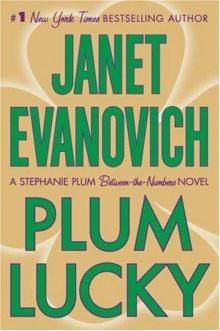 Plum Lucky
Plum Lucky Full Bloom
Full Bloom Wife for Hire
Wife for Hire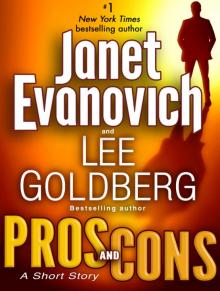 Pros and Cons
Pros and Cons Fortune and Glory
Fortune and Glory Motor Mouth: A Barnaby Novel
Motor Mouth: A Barnaby Novel Naughty Neighbor
Naughty Neighbor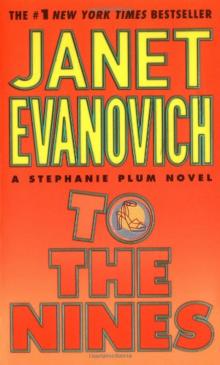 To the Nines
To the Nines The Husband List
The Husband List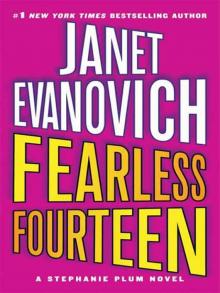 Fearless Fourteen: A Stephanie Plum Novel
Fearless Fourteen: A Stephanie Plum Novel Smitten - LOVESWEPT - 392
Smitten - LOVESWEPT - 392 Plum 12 - Twelve Sharp
Plum 12 - Twelve Sharp Smokin' Seventeen: A Stephanie Plum Novel (Stephanie Plum Novels)
Smokin' Seventeen: A Stephanie Plum Novel (Stephanie Plum Novels) Top Secret Twenty-One: A Stephanie Plum Novel
Top Secret Twenty-One: A Stephanie Plum Novel SMITTEN (Loveswept, No 392)
SMITTEN (Loveswept, No 392)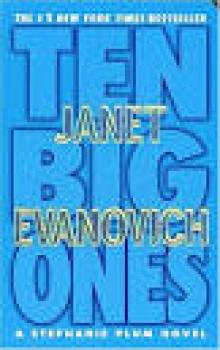 Plum 10 - Ten Big Ones
Plum 10 - Ten Big Ones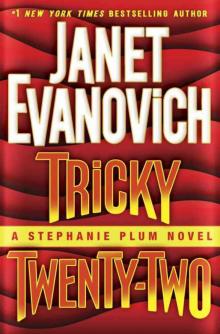 Tricky Twenty-Two: A Stephanie Plum Novel
Tricky Twenty-Two: A Stephanie Plum Novel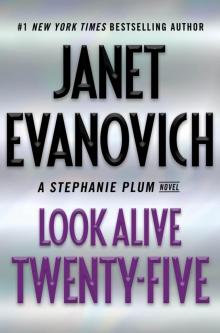 Look Alive Twenty-Five
Look Alive Twenty-Five Wicked Charms: A Lizzy and Diesel Novel
Wicked Charms: A Lizzy and Diesel Novel Motor Mouth
Motor Mouth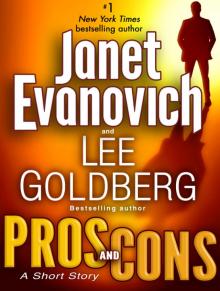 Pros and Cons: A Short Story
Pros and Cons: A Short Story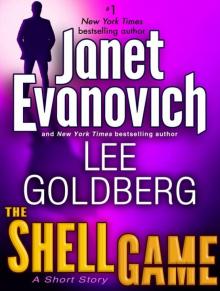 The Shell Game: A Fox and O'Hare Short Story (Kindle Single)
The Shell Game: A Fox and O'Hare Short Story (Kindle Single) Plum Boxed Set 1, Books 1-3 Stephanie Plum Novels)
Plum Boxed Set 1, Books 1-3 Stephanie Plum Novels)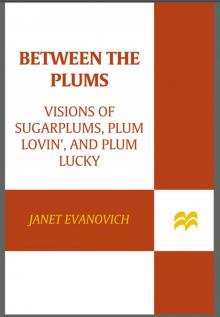 Between the Plums
Between the Plums